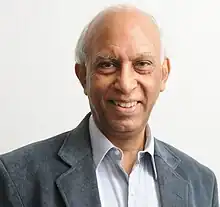Ishtiaq Ahmed | |
|---|---|
 | |
| Born | 24 February 1947 |
| Citizenship | Swedish |
| Alma mater | University of Stockholm University of the Punjab Forman Christian College St. Anthony's High School |
| Scientific career | |
| Fields | Political Science |
| Institutions | Visiting Professor, Government College University Lahore, Pakistan |
Ishtiaq Ahmed (Punjabi, Urdu: اشتیاق احمد; born 24 February 1947) is a Swedish political scientist and author of Pakistani descent. He holds a PhD in Political Science from Stockholm University. He is Professor Emeritus of Political Science at Stockholm University.[1][2][3]
Early life
Ahmed was born in Lahore, British Punjab, in 1947.[4] He belongs to the Arain tribe of Punjabis.[5]
Books
His books include:
- People on the Move: Punjabi Colonial and Post-Colonial Migration (2004, chapter six, "Forced migration and ethnic cleansing in Lahore in 1947 : some first person accounts").[6]
- The Politics of Religion in South and Southeast Asia (2011, editor)[7]
- The Punjab Bloodied, Partitioned and Cleansed (2012)[8][9] It won a prize for best non-fiction book of 2012 and the Coca Cola Prize at the Karachi Literature Festival in 2013.[10][11]
- Jinnah: His Successes, Failures and Role in History (2020)[12][13]
References
- ↑ Entry at University of Stockholm Archived 5 July 2007 at the Wayback Machine with the University of Stockholm's homepage
- ↑ Hasan, Shazia (11 March 2023). "Bengalis were in majority, but Bangla was not made national language: Dr Ishtiaq Ahmed". Dawn. Retrieved 26 April 2023.
- ↑ Thapar, Karan (18 March 2016). "'Hindu, Sikh pressure led to Punjab's partition'". The Express Tribune. Retrieved 26 April 2023.
- ↑ "The Punjab Bloodied, Partitioned and Cleansed". Oxford University Press.
- ↑ Ahmed, Ishtiaq (18 April 2006). "There is many a slip betwixt cup and lip". Daily Times. Pakistan. Archived from the original on 15 July 2014.
Additionally, the Arain group, to which I belong [...]
- ↑ Murphy, Anne (February 2005). "People on the Move: Punjabi Colonial, and Post-Colonial Migration. Edited by Ian Talbot and Shinder Thandi. Subcontinent Divided: New Beginning. Karachi: Oxford University Press, 2004. xx, 238 pp. Rs 350 (cloth)". The Journal of Asian Studies. 64 (1): 240–241. doi:10.1017/S0021911805000628. ISSN 0021-9118. S2CID 162416728.
- ↑ GHOSH, PARTHA S (2012). "Religion-Politics Interface". Economic and Political Weekly. 47 (2): 34–36. ISSN 0012-9976. JSTOR 23065604.
- ↑ Ali, Mahir (18 April 2012). "Blood on the tracks of history". Dawn. Retrieved 26 April 2023.
- ↑ White, Jenny (22 June 2020). "Turkey in the 1970s: The Cultural Logic of Factionalism". Turkey in Turmoil. De Gruyter. p. 306. doi:10.1515/9783110654509-015. ISBN 978-3-11-065450-9. S2CID 241571497.
- ↑ "klf 2013 | Karachi Literature Festival". Karachi Literature Festival. Retrieved 26 April 2023.
- ↑ Salman, Peerzada (18 February 2013). "'Pakistan is open for business'". Dawn. Retrieved 26 April 2023.
- ↑ Thapar, Karan (23 March 2022). "Watch: 'Jinnah Did Not Just Want Partition, He Wanted to Dismember India'". The Wire (India). Retrieved 26 April 2023.
- ↑ Ahmed, Ishtiaq (15 September 2020). "How Jinnah Dismissed Congress's Minority Rights Proposals to Justify Two-Nation Theory". The Wire (India). Retrieved 26 April 2023.
External links
- Official website
- Ahmed, Ishtiaq at Stockholm University
- Ishtiaq Ahmed, articles at The Friday Times
This article is issued from Wikipedia. The text is licensed under Creative Commons - Attribution - Sharealike. Additional terms may apply for the media files.